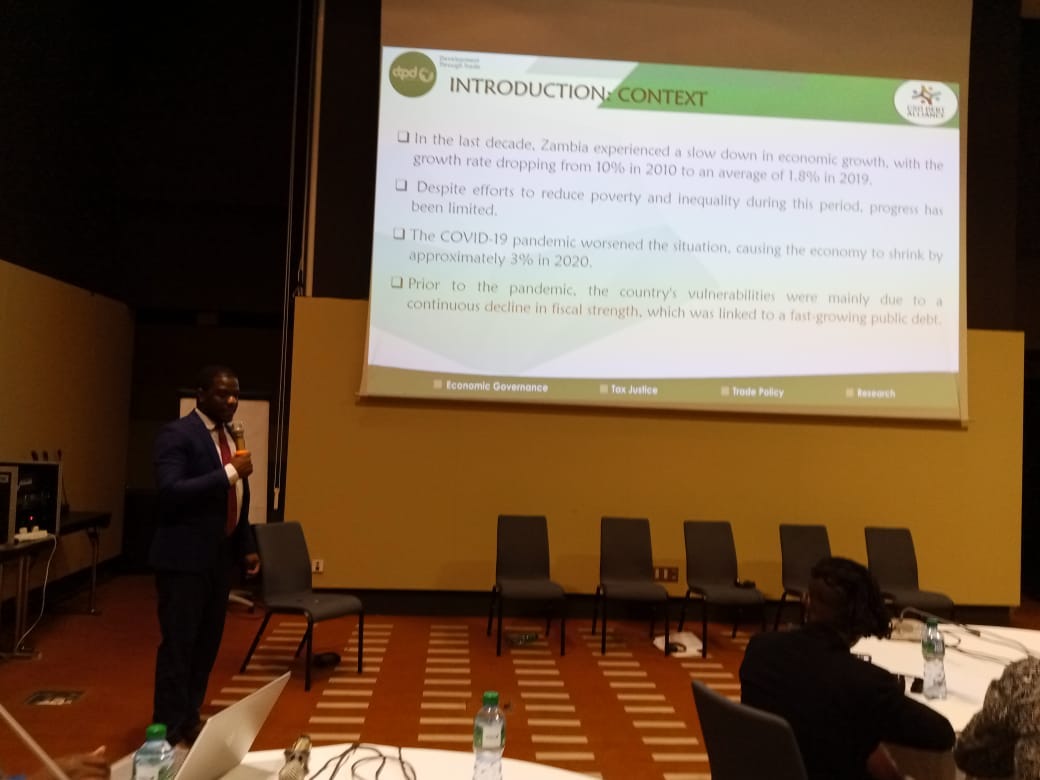Zambia's Debt Crisis and the Common Framework: Insights from CSO Debt Alliance Presentation
Zambia became the first country to apply for debt restructuring under this framework in 2021.
Dakar, Senegal -A prominent figure from the CSO Debt Alliance, Peter Mumba, delivered a compelling presentation during the 3rd Edition of the African Conference on Debt and Development held from August 30th to September 1st, 2023, in Dakar, Senegal, writes Winston Mwale.
Mumba's presentation, titled "Profiling Zambia's Experience Under the G20 Common Framework," shed light on Zambia's ongoing struggle with a mounting debt crisis and its engagement with the G20 Common Framework for Debt Treatment.
"In the last decade, Zambia experienced a slowdown in economic growth, with the growth rate dropping from 10% in 2010 to an average of 1.8% in 2019," noted Mumba, setting the stage for his presentation.
"Despite efforts to reduce poverty and inequality during this period, progress has been limited."
The COVID-19 pandemic further exacerbated Zambia's economic woes, causing a 3% contraction in 2020. Pre-pandemic vulnerabilities stemmed from a continuous decline in fiscal strength, closely tied to a rapidly growing public debt.
Mumba emphasized that in 2020, nearly half of Zambia's National Budget's expenditure was allocated to servicing its debt, hampering other critical investments.
Mumba discussed Zambia's distinction as Africa's first sovereign country to default in 2020 and 2021, attributing this largely to the COVID-19 pandemic's impact on the country's Debt Repayment Moratorium (DRM) efforts.
However, Mumba pointed out that the G20's Common Framework, established in November 2020, offered hope for nations like Zambia.
Zambia became the first country to apply for debt restructuring under this framework in 2021.
"The Common Framework provides a mechanism for Low-Income Countries (LICs) to seek debt restructuring when unavoidable," explained Mumba.
"Under this framework, an Official Creditor Committee (OCC) was formed for Zambia, co-chaired by China and France, ultimately paving the way for the IMF Board to approve an assistance package for Zambia."
Mumba's presentation delved into several key aspects:
Macroeconomic Context: He provided a macroeconomic context to Zambia's application under the Common Framework, discussing the interplay between the framework and the IMF Extended Credit Facility (ECF).
Factors Influencing Zambia's Approach: Mumba examined factors that informed Zambia's interactions with creditors under the Common Framework, with a particular focus on the role of Zambia's Official Creditor Committee.
Debt Sustainability and IMF Involvement: He highlighted that Zambia's debt was assessed as "unsustainable" by the IMF in 2019, underscoring the need for comprehensive debt restructuring.
Complementary Measures: Mumba discussed complementary measures Zambia's government had undertaken, including securing an IMF loan and canceling undisbursed loans, to address its fiscal challenges.
Role of the OCC: The Official Creditor Committee's role in ensuring fair and equitable debt treatment was outlined, crucial to the comparability of treatment principle.
Future Challenges and Solutions: Mumba noted the deficiencies in the current sovereign debt restructuring process and the need for reform, emphasizing the importance of consensus among key stakeholders.
Long-Term Solutions: He concluded by advocating for strengthening the legal framework governing public debt and ensuring parliamentary oversight.
In his closing remarks, Mumba called for greater civil society mobilization and advocacy to influence policy-makers on prudent debt management and equitable investment in public services across Africa.
As Zambia continues its journey to navigate the complexities of debt restructuring, the insights presented by Mumba serve as a valuable resource for both policymakers and global stakeholders.




